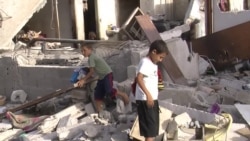In the last six years, there have been three wars between Israel and Hamas in the Gaza Strip. In the latest conflict, some 2,100 Palestinians were killed and 73 Israelis died in a hail of rocket and tank fire and air strikes. The repeated cycles of violence have left civilians on both sides traumatized.
After 50 days of war between Israel and Hamas, the militant political faction that controls the Gaza Strip, this is what parts of Gaza city look like.
This is the physical damage. But after three wars in six years and repeated conflicts since 1948, there is also significant mental trauma, said psychiatrist Sami Owaida.
“I call it Gaza Syndrome because Gaza, since we became aware of the war in [19]48, our parents, grandparents, were exposed to such trauma, and now we live trauma across generations, so we have what is called ongoing trauma,” said Owaida.
But the latest 50-day war that ended August 26 was particularly punishing, people here say. Owaida said children are developing typical trauma symptoms like hyperactivity, sleep disturbances, nightmares, bedwetting, aggressive behavior and lack of appetite.
More than half the population here is under 18 years old. Repeated fighting and Israel’s economic blockade have left youth like Isah al Shimbery depressed about their future.
“Today, people can’t handle another war, because all of our dreams and ambitions have been crushed. People need to think about their future. But, if we have a war every two years, people will no longer have any dreams, or any ambitions,” said Shimbery.
Thousands of Hamas rockets also have landed in Israel. And Israelis also live in a constant state of insecurity, said Yosef Kuperwasser of the Israeli Ministry of Strategic Affairs in Jerusalem.
“Five million Israelis developed a trauma from being targeted by Hamas rockets for years now, and specially during this last operation, where the rockets reached almost everywhere in Israel. It’s the trauma, should refer to the trauma of everybody.”
Even as life gets back to normal in Gaza, the psychological scars of the conflicts likely will persist for much longer.






